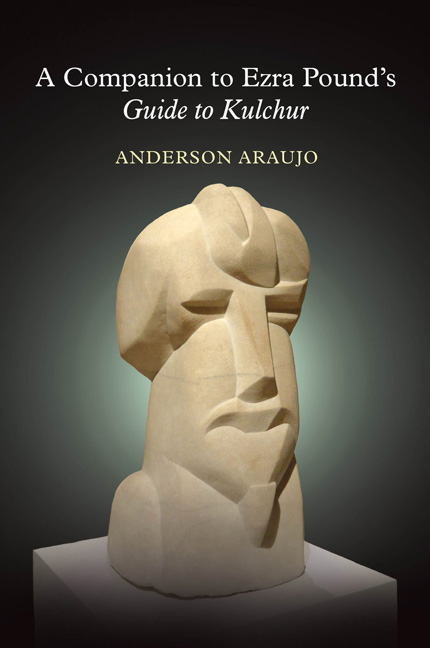Book contents
- Frontmatter
- Contents
- Acknowledgments
- Abbreviations
- Introduction
- Guide to Kulchur
- Part I
- Section I
- Section II
- Part II
- Section III
- Section IV
- Part III
- Section V
- Section VI
- Part IV
- Section VII
- Section VIII
- Section IV
- Part V
- Section X
- Section XI
- Part VI
- Section XII
- 53 Study Of Physiognomy
- 54 And Therefore Tending
- 55 Pergamena Deest
- 56 Watch The Beaneries
- Section XIII
- Addenda: 1952
- Notes
- Index
55 - Pergamena Deest
from Section XII
- Frontmatter
- Contents
- Acknowledgments
- Abbreviations
- Introduction
- Guide to Kulchur
- Part I
- Section I
- Section II
- Part II
- Section III
- Section IV
- Part III
- Section V
- Section VI
- Part IV
- Section VII
- Section VIII
- Section IV
- Part V
- Section X
- Section XI
- Part VI
- Section XII
- 53 Study Of Physiognomy
- 54 And Therefore Tending
- 55 Pergamena Deest
- 56 Watch The Beaneries
- Section XIII
- Addenda: 1952
- Notes
- Index
Summary
Pergamena Deest: (L.) “[I] do not have the parchment.” Mihi pergamena deest is also the one-line postscript to Pound's “Marvoil,” a first-person lyric featuring the Perigordian troubadour Arnaut de Mareuil (or Maruelh) (fl. 1170–1200).1
Downing St, Cambridge: Shorthand for the University of Cambridge's Faculty of Economics and Politics, which was housed in the Downing Street science buildings complex in the early 1930s.
Rackham's note: Cf. note GK 341.
Constantine and Justinian: Cf. note GK 40.
Just Price: Cf. note GK 167.
“Hence the tendency to think of the End … the ‘theoretic’ intellect”: Rackham's synopsis of Aristotle's “End” (Telos) is informed by its fundamental dual meaning as “completion or perfection” and “ultimate point, the last term of a series, the summit and crown of a process.”
“split man” in Mr Wyndham Lewis’ Apes: In his sprawling roman-a-clef, The Apes of God (1930), Lewis satirizes and lampoons London's interwar artistic and literary community as a motley crew of dilettantes and imitators (“apes”) of true artists. Chief among these dabblers is Julius Ratner, the “split-man.” Ratner illustrates the “schismatic tendency” in the Aristotelian privileging of the “‘theoretic’ intellect” as well as in the contemporary Freudian fragmentation of the self because as an author, publisher and bookseller, Ratner selfservingly “splits” himself into the role of creator, publisher, and distributor.
Dante put Aristotle in Limbo: Cf. note GK 315.
Master of those that cut apart, dissect and divide: A spoof of Dante's honorific title for Aristotle—“maestro di color che sanno” (“the Master of those who know”) (cf. note GK 315).
- Type
- Chapter
- Information
- A Companion to Ezra Pound's Guide to KulcherGuide to Kulcher, pp. 352 - 353Publisher: Liverpool University PressPrint publication year: 2018



